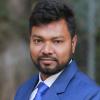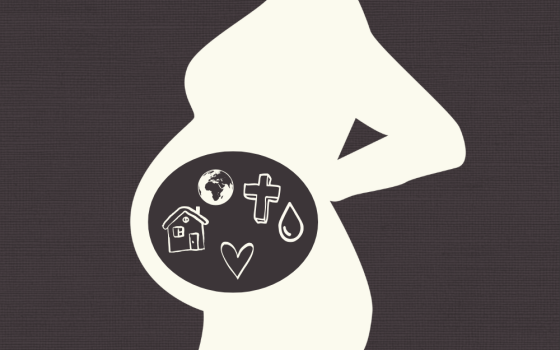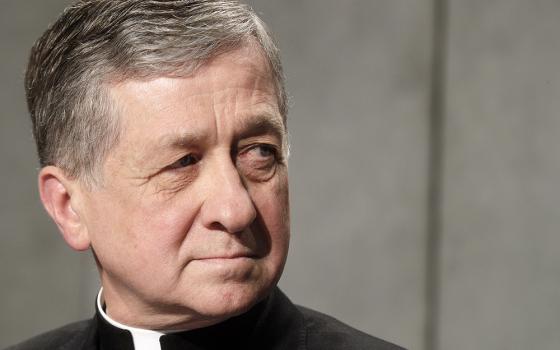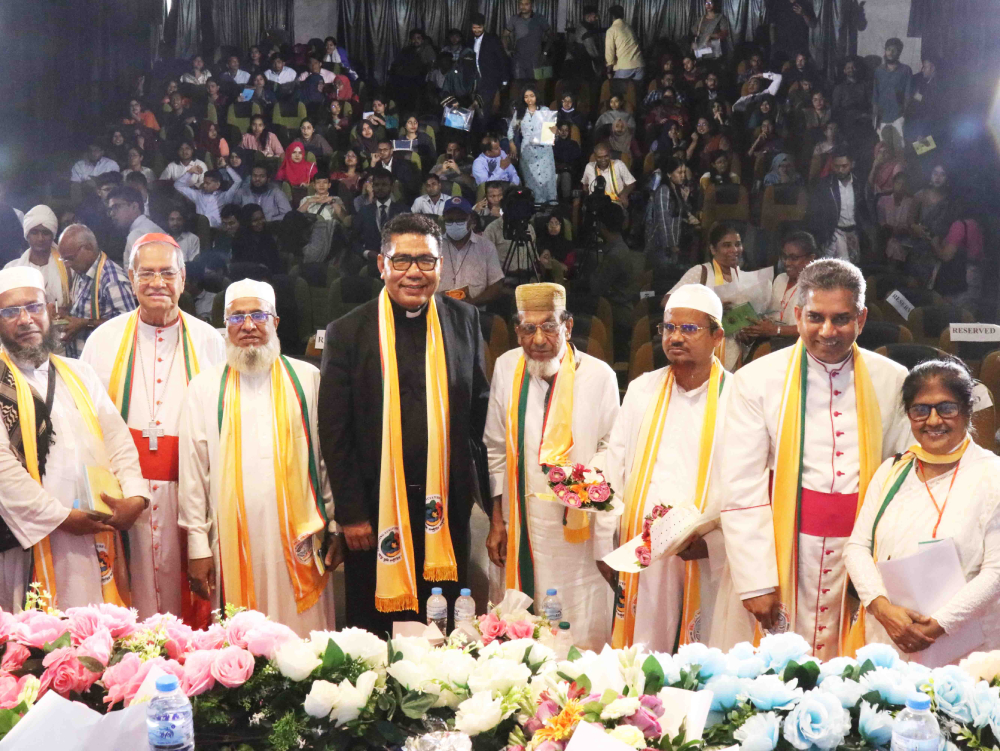
Sr. Reba Veronica D'Costa poses for a photo with Dhaka Cardinal Patrick D'Rozario (second from left), a team from the Vatican and other religious scholars on Sept. 7 in Dhaka. (Stephan Uttom Rozario)
As the coordinator of the Inter-Church Unity and Inter-Religious Dialogue Commission of the Dhaka Archdiocese, Congregation of Our Lady of the Missions Sr. Reba Veronica D'Costa, hopes to spread a culture of harmony across the world, starting with her students.
In 45 years of religious life, D'Costa, 68, has worked in formation houses, taught in schools, held leadership positions and served as a provincial. Costa is currently working as a student counselor at St. Xavier's Girls' School and College in Dhaka. She also works as a trainer for teachers in various schools and colleges.
From Sept. 6-11, Cardinal George Koovakad, prefect of the Vatican's Dicastery for Interreligious Dialogue and his team visited Dhaka, Bangladesh. D'Costa spoke to Global Sisters Report about the cardinal's visit and the need for interfaith dialogue in Muslim-majority Bangladesh.
Global Sisters Report: Cardinal George Koovakad recently visited Bangladesh. What is the significance of this visit?
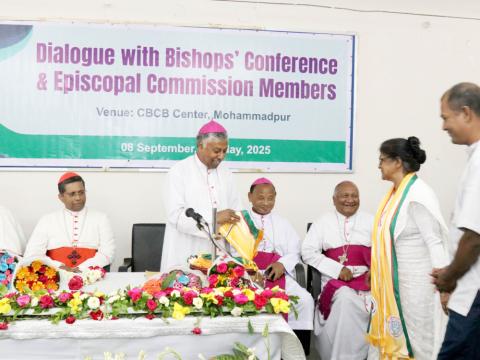
Sr. Reba Veronica D'Costa speaks to the Vatican team and members of the Catholic Bishops' Conference of Bangladesh. (Stephan Uttom Rozario)
D'Costa: Cardinal George Jacob Koovakad and his team visited Bangladesh from Sept. 6-11. The Vatican's ambassador to Bangladesh, Archbishop Kevin Randall, took this initiative to establish a relationship between the Vatican and Bangladesh, and to develop relations among the Christians and people of other religions in the country. They met the head of government, the chief justice. They had a dialogue with students and resource persons of different religions. They had a dialogue with different religious leaders, Catholic leaders. So, I was in charge of organizing the international interfaith seminar.
You were the coordinator for the international interfaith dialogue event. What was your experience like?
I have experienced that leaders of all religions — Hindus, Muslims, Buddhists, Christians — came to this event. The main idea was to promote a culture of harmony so that we can spread it among students of different religions across the country.
Because students are the leaders of the future, they should understand what harmony is. What are the values of different religions? Then a lot of our work on harmony will go forward. In my speech, I emphasized the culture of harmony. If I cannot love the mother earth, if I cannot take care of the creation, then we will remain chaotic; our harmony will not be fruitful enough.
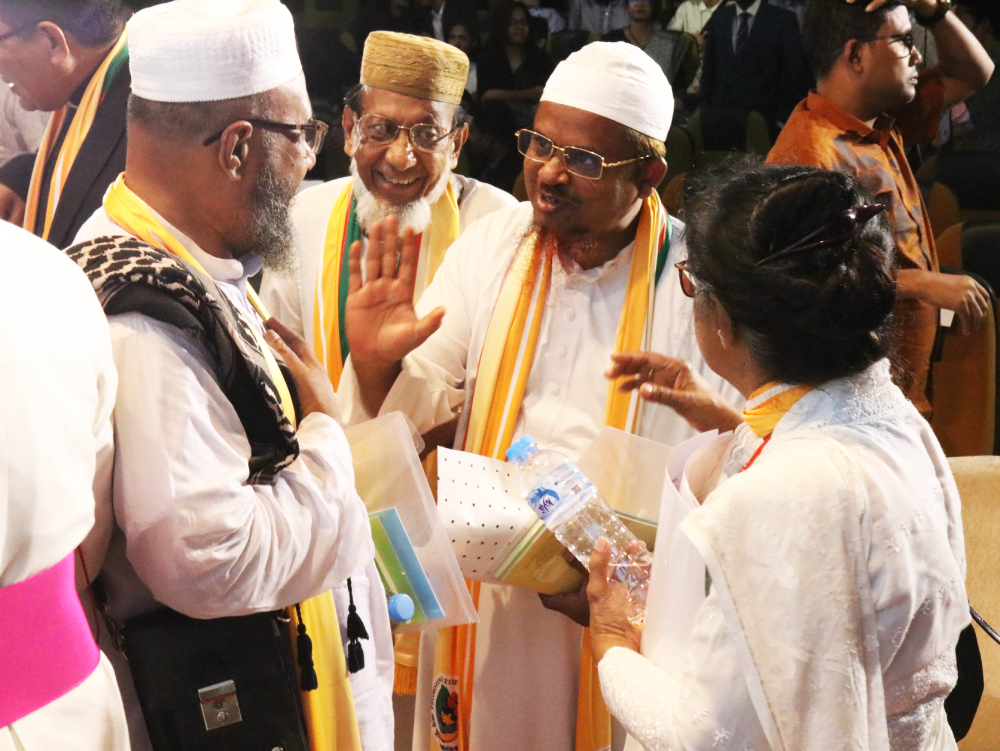
Sr. Reba Veronica D'Costa often joins in dialogue with other religious scholars as a coordinator of the Inter-Church Unity and Inter-Religious Dialogue Commission of the Dhaka Archdiocese. (Stephan Uttom Rozario)
How would you analyze the results of this visit?
The arrival of Cardinal Koovakad and his team in Bangladesh was very significant for me. Because all three of his team were Asians and as a result, we were able to easily mix with them, understand their harmony.
Through these various programs, the harmony of one religion with another has become stronger. This program was appropriate for Bangladesh at this time because Bangladesh is going through political instability, going through unrest. At this time, as Christians, we have been doing everything we can to promote harmony, respect, love and listening to others. I think this interfaith dialogue was necessary in the context of Bangladesh and has been quite fruitful.
The cardinal came, held dialogue and sat with religious leaders. Why did he participate in the visit?
I would say that his main objective at this time was to restore our harmony. The cardinal has taken on a new responsibility and we are in a Muslim-majority country, so his visit has been significant.
For example, when we went to the country's national mosque, Baitul Mukarram, our meetings and discussions with their religious leaders have manifested our harmony and at the same time strengthened this bond. Cardinal Koovakad gave everyone small gifts from different religious leaders as a sign of the Vatican, a sign of harmony. We went to Buddhist temples and Hindu temples, and we discussed the same, and conveyed the message of peace.
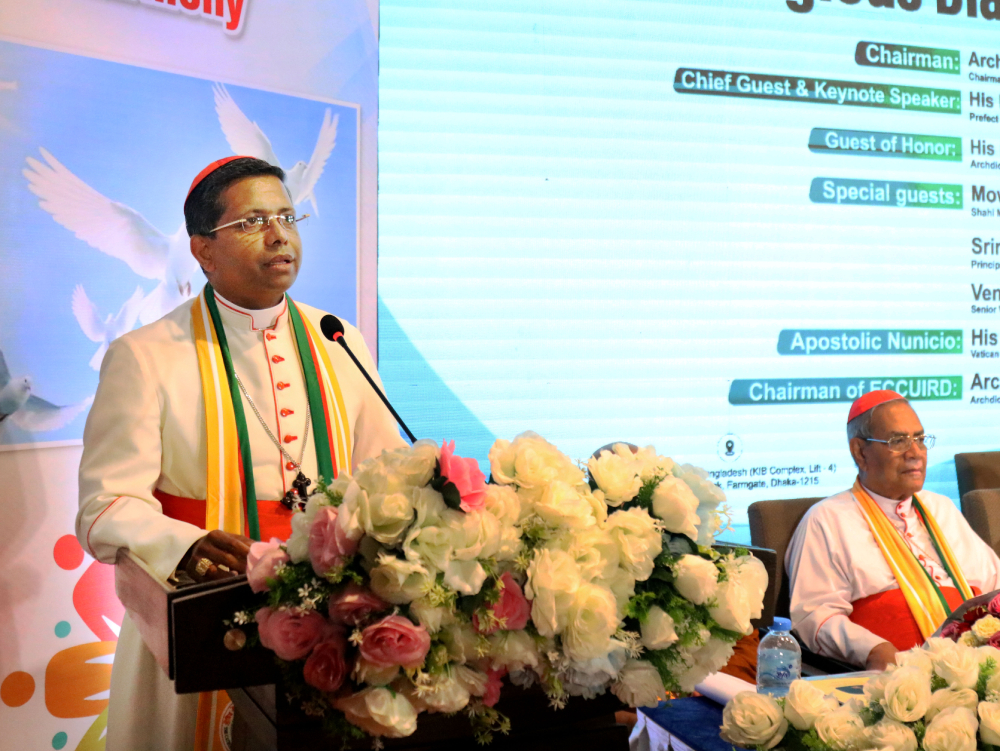
From Sept. 6-11, Cardinal George Koovakad, prefect of the Vatican's Dicastery for Interreligious Dialogue and his team visited Dhaka for an interreligious conference. (Stephan Uttom Rozario)
This is how giving time, listening to each other, and respecting each other strengthens coexistence. Pope Francis came to Bangladesh and repeatedly said, "You must listen, listen and listen."
How much can Catholics contribute to interfaith harmony in Bangladesh despite being small in numbers?
To be honest, we Catholics are trying from our end, Muslims are trying from their perspective. So, everyone is trying from their end. But the problem is that we are having interfaith dialogue with those who are aware. We are not able to bring those who are destroying harmony.
The history of our church is very difficult, there is a sad history, there are events like the Crusades. We are trying to come out of that and see people of all nations and religions with respect. Because no religion asks us to commit crimes, does not ask us to do injustice.
The death of Jesus on the cross for the salvation of people, for the truth, is still happening among people today. We cannot conquer the whole world in one day. We have to move forward slowly, we have to light a candle and remove a little darkness, we have to light another candle and remove a little more darkness, and we as a church are moving forward with this objective. We want to spread Christian love, brotherhood, values and harmony. We are all created by one creator, we have to understand, we have to explain.
Advertisement
Has Bangladesh been the site of interfaith dialogue with people of different religions?
Actually, we have to understand that there are some fundamental religions in the world. In Bangladesh, we keep Hinduism, Islam, Buddhism and Christianity in front of us, but beyond these, there are many other religions that we do not know about. Again, there are people who do not follow any religion but they have their own place of faith, such as humanity. So, this difference is between people.
I think this interfaith dialogue is not for nothing. Now religion is becoming political in Bangladesh. … We have to come out of this and this is possible through dialogue. Without dialogue, misunderstandings remain.
So I would say that dialogue is needed to establish the rights of every person in Bangladesh. The constitution has given equal rights to every person and through this dialogue, this constitutional right will be further enriched. We need to understand rights and responsibilities and this should be understood by people of all religions.
What other purpose is there for this kind of dialogue in Bangladesh?
In Bangladesh, it is often heard that there is anarchy over religion, churches and temples are being vandalized. Now, Islamic religious shrines are being demolished. As a human being cannot do one thing; only sick people do this. Therefore, dialogue is a means of treatment, dialogue is needed in terms of deeper knowledge. Then this dialogue will continue everywhere. Dialogue means listening, and it is necessary to have dialogue without any conditions. If we can reach this stage, politicians in our country will not be able to use religion in politics. Instead of using religion in politics, it is necessary to use religion in the search for God.
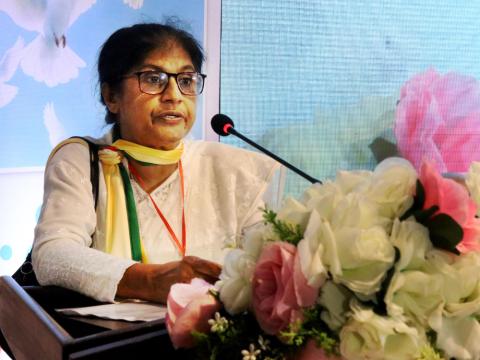
Congregation of Our Lady of the Missions Sr. Reba Veronica D'Costa delivers a speech to an interreligious conference in Dhaka. (Stephan Uttom Rozario)
How are sisters working on coexistence in remote areas through interfaith dialogue?
Apart from me, various sisters are working on interreligious dialogue in small parishes in different dioceses. Now in remote areas like we started in Chittagong and child marriages were done there, and those who did not want to get married would run away and come to the sisters. The Congregation of Our Lady of the Missions sisters started schools with them.
In many places, there are no Christians around, so the sisters work among people of other religions. We want interreligious dialogue to be practiced in the various schools and colleges we run. For example, out of 3,000 girls in St. Xavier's Girls' School and College, only 60 are Christians, the rest are of other religions. So, we are trying to ignite conscience and light among people through education.
Why is political and religious unrest happening right now?
The reason is that we do not understand the meaning of freedom of speech. In the name of freedom of speech, people of one religion are mocking or abusing other religions. Again, if we look at the context of Bangladesh, there were not so many Islamic religious madrasas before. They are holding religious sermons and making insulting speeches to small religions there. Now there is no respect for one religion for another. The way religious extremism is spreading is really alarming.
The scholars of other religions that I talk to are also worried about this religious extremism. They are also emphasizing the importance of teaching students correct religious education and values. And if this cannot be done, there will be widespread unrest regarding religion.
